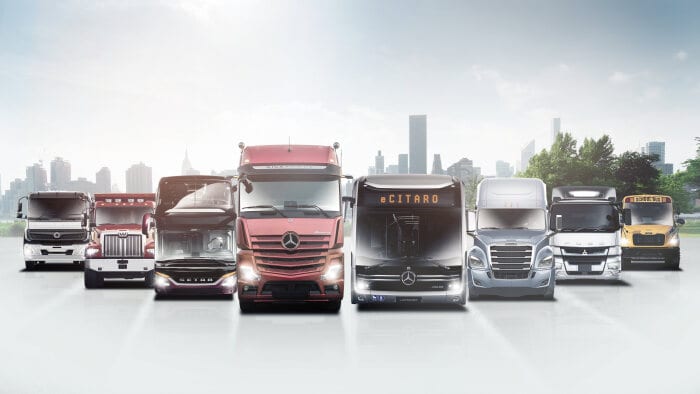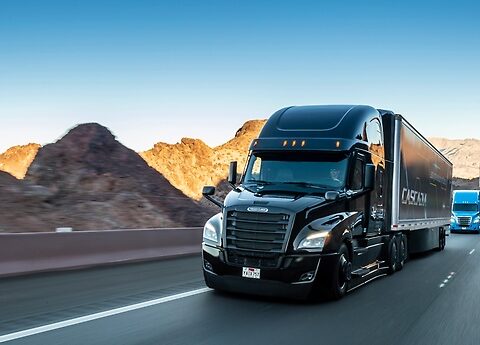Stuttgart –Over the entire business year, this development marked a decrease of around 30 percent in both the North-American and EU30 market region. In the second quarter, most severely affected by COVID-19, truck markets in North America and Europe even dropped by more than half compared to April and May of the previous year. Naturally, this development has had an impact on the company’s unit sales, revenues and earnings. With approximately 378,500 trucks and buses delivered, Daimler Trucks & Buses 2020 unit sales were around one-third below the prior-year level (previous year: 521,100). As a result of this significant decrease in unit sales volume, the companys’ revenue dropped to around € 35 billion in 2020 (previous year: € 44 billion). The adjusted EBIT (earnings before interests and taxes) was € 678 million (previous year: €2,672 million). The adjusted Return on sales (RoS) in 2020 was at 2.0 percent, and thus down on previous year of 6.0 percent. Cash flow before interest and taxes (CFBIT) amounted to € 2,513 million in the reporting year (previous year: € 2,654 million).
In 2020, research and development expenditure of Daimler Trucks & Buses amounted to € 1.5 billion (previous year: € 1.7 billion). Despite pandemic-related reductions in the development budget, the topics of automated driving, electromobility – including the eActros – and connectivity played an important role. Other areas of focus included successor generations for existing products, fuel efficiency and the reduction of emissions, as well as tailor-made products and technologies for important growth markets.
Encouragingly, a noticeable recovery occurred in Q4 in the most important markets and regions, especially North America and the EU30. Daimler Trucks sold a total of approximately 121,000 units in Q4 of 2020, compared with only about 61,000 units in the second quarter, which was hit hardest by the pandemic. Another positive signal for a return to normality in this context is order intake, which for Daimler Trucks & Buses in the full year 2020 was practically back at the prior-year level. With an order intake of approximately 175,000 units, Q4 of 2020 was also one of the strongest quarters for orders in the company’s history. Despite difficult conditions in 2020, Daimler Trucks, as one of the world’s largest commercial vehicle manufacturers, scored with the quality of its products and services and was able to further expand its market leadership in almost all core markets.
Positive outlook for 2021: market recovery should lead to increased unit sales, revenue and return on sales
For the year 2021, Daimler Truck AG assumes that the global economy will recover strongly after last year’s deep recession. This economic revival should also result in an increase in demand for the most important truck markets. For the North America and EU30 regions, the company therefore expects a significant increase in the markets for heavy trucks. Daimler Trucks expects a slight increase in the Brazilian market. In Japan, market volume is expected to remain at approximately the prior-year level. Daimler Trucks & Buses expects to benefit from this market development and anticipates a significant increase in unit sales in the 2021 financial year. The company also expects its revenue in the 2021 financial year to be significantly above the prior-year level. Daimler Trucks is aiming for a significant increase in adjusted return on sales to six to seven percent
Martin Daum, Chairman of the Board of Management of Daimler Truck AG and Member of the Board of Management of Daimler AG said: “Our business picked up significantly in the second half of 2020, and we will maintain this momentum in the current year. We are pursuing two strategic goals: First, we want to fully exploit our earnings potential. Here – with a planned return on sales of six to seven percent – we will take a major step forward this year. Secondly, we want to shape the transformation of our industry from the top. Here, too, we will reach important next milestones in 2021. In zero-emission transportation, we are bringing our Mercedes-Benz eActros heavy-duty distribution truck into series production. In automated driving, we are testing a next generation of our highly automated prototypes on additional routes in New Mexico. And in connectivity, we are offering our customers in all regions further digital services that enable them to use our trucks and buses even more efficiently. In perspective, we want to be the company that stands for the CO2-neutral, safe and efficient passenger and freight transport of the future like no other in our industry. So our path forward is clear, and our planned independence will help us make even faster progress here in the future.”
Planned Spin-off of Daimler Truck AG to release additional entreprenurial potential
With the planned spin-off, the future independent Daimler Truck AG intends to create measurable added value for its shareholders by implementing its strategic plans in a more agile manner, increasing its profitability and further advancing the development of CO2-neutral drive technologies for trucks and buses. Daimler Truck AG responded to the effects of the COVID-19 pandemic with great dedication and immense experience and made the right decisions during the crisis. The measures introduced to adjust costs and capacities, including the use of short-time work in Germany, led to cost reductions in all functional cost areas. A significant reduction in fixed costs, which was achieved through disciplined resource control and the gradual implementation of restructuring measures, had a particularly beneficial effect.
The business model of Daimler Truck AG is successful and based on a solid financial foundation. The company has proven that it can manage the market cycles that are typical for the industry and will work even more intensively on efficient cash flow management in the future. At the same time, Daimler Truck AG is pursuing clear strategies to improve its financial performance. The charisma of strong and globally active brands coupled with the economies of scale of a global platform strategy and the expertise of the recognized technology leader in the fields of CO2-neutral, safe, and efficient transport are helping in this regard. In parallel, Daimler Truck AG continues to work on improving its own cost position – with a focus on Mercedes-Benz Trucks in Europe. Here, initiatives to increase efficiency had already been launched in 2019, which are being consistently implemented further – currently since October 2020 by the so-called Transformation Office. The aim is also to further expand the global market position by further strengthening the product portfolio on the one hand, and to drive forward the transformation of the industry with innovative co-operations on the other.
Global partnerships: shaping the transformation together
The transformation of the commercial vehicle industry, which was largely initiated by Daimler Truck AG, requires a high level of resources. Against this background, the company is also consciously entering into strategically sensible partnerships. Particularly in the case of new and investment-intensive technologies, more can be achieved more quickly together with suitable partners. The planned cooperation with the Volvo Group on fuel cells is an important example of this. The aim is to develop, produce and market fuel cell systems ready for series production.
The focus is on use in heavy trucks, but the systems are also to be offered for other applications. It is planned that the Volvo Group will acquire 50 percent of the shares in the existing company Daimler Truck Fuel Cell GmbH & Co. KG for the sum of approximately €0.6 billion on a cash- and debt-free basis. Daimler Truck AG and the Volvo Group will thus have equal shares in the fuel cell joint venture. The companies will remain competitors in all other business areas, such as vehicle technology or vehicle integration of fuel cells. The strategic partnership with the U.S. company Proterra Inc, a leading electric bus manufacturer and battery producer for commercial vehicles in the U.S., will also help to further advance the electrification of commercial vehicles.
In the field of autonomous driving (SAE level 4), Daimler Trucks and its affiliate Torc Robotics are pushing their joint efforts. Daimler Trucks will use Torc 2021 to intensify road testing of autonomous SAE level 4 trucks, as well as to introduce the next generation of prototype vehicles for operational testing on existing and new routes, and will also open an additional verification and testing centre in New Mexico.
For testing autonomous SAE level 4 trucks, Daimler Trucks subsidiary Torc Robotics will use Amazon Web Services (AWS) cloud solutions in the future. The AWS systems provide both scalability and speed necessary for secure and stable transmission, storage and computation of all data collected during the journey. In 2020, Daimler Trucks and Torc established an additional important co-operation with Luminar Technologies, Inc. – a leading provider of lidar hardware and software technology. The experts from Daimler Trucks, the US subsidiary DTNA and Torc Robotics, as well as the specialists at Luminar are working closely together to further develop the lidar technology for the corresponding high speeds on US highways. To strengthen this partnership, Daimler Trucks has acquired a minority stake in Luminar.
At the same time, the Daimler Trucks division recently strengthened its position with a comprehensive strategic partnership with Waymo in the USA. To kick off the collaboration, Waymo’s technology will be combined with a variant of the Freightliner Cascadia truck model from US subsidiary Daimler Trucks North America (DTNA), specially developed for this purpose. With SAE level 4 trucks, Waymo and Daimler Trucks strive to improve road safety and productivity for fleet customers. The Freightliner Cascadia equipped with Waymo Driver will be available in the US in the coming years.
Global cooperation in medium duty engines
Daimler Truck AG and Cummins Inc. are planning global cooperation in medium-duty commercial vehicle engines. The two companies announced this a few days ago. As part of the planned strategic partnership, Cummins will invest in the further development of medium-duty engine systems for Daimler Trucks and Buses and the global production and delivery of medium-duty engines by Cummins for Daimler Trucks and Buses beginning in the second half of the decade.
Cummins Inc. will establish an engine plant within the Mercedes-Benz Mannheim campus to produce medium-duty engines compliant with the Euro VII emissions standard for Mercedes-Benz and ensuring continued joint success in the medium-duty vehicle segment. This results in the necessary economies of scale to produce such engine economically in the future. Cummins will use its existing footprint and strong production and supply chain networks in all other regions for use in other Daimler Trucks’ brands, including those of Daimler Trucks North America.
In the future, Daimler Truck AG will focus on the further progression of zero-emission drive technologies as well as further development of commercial heavy-duty drivetrains (HDEP). The production of the current medium-duty engine generation (MDEG) by Daimler Truck AG will successively phase out with the start of production of the Cummins engines. In addition, the partners will evaluate broader global strategic collaboration.
Electrification of truck portfolio with battery and fuel-cell
In September 2020, Daimler Trucks celebrated the world premiere of the fuel-cell concept truck Mercedes-Benz GenH2 Truck. The truck in its series version is designed for flexible and demanding long-distance haulage operations using liquid hydrogen. This year, first prototypes of the vehicle will be tested on the roads and customer trials are scheduled for 2023. The first GenH2 Truck series vehicles can be expected from 2027.
Also in September 2020, Daimler Trucks presented for the first time a preview of a purely battery-powered long-haul truck: the Mercedes-Benz eActros LongHaul. The eActros LongHaul is designed to cover regular journeys on plannable routes in an energy-efficient manner. Daimler Trucks plans to have the eActros LongHaul ready for series production in 2024. Already this year, the battery-electric Mercedes-Benz eActros for heavy urban distribution will go into series production. Start of series production of the Mercedes-Benz eEconic low-floor truck, which is based on the eActros, is planned for 2022. Moreover, Daimler Trucks systematically implements its electrification strategy with its Freightliner and FUSO brands. Battery-powered, locally CO2-neutral trucks and buses have already covered more than 10 million kilometers in customer operation worldwide.
Daimler Trucks will embed its electric vehicles in a holistic ecosystem that includes consulting services for electric mobility, such as analyzing routes, checking possible subsidies, supporting operational fleet integration and developing suitable charging-infrastructure solutions.
Expansion of market positions in key markets
In addition to the further development of Daimler Truck AG and its products in the direction of CO2-neutral and autonomous transport of the future, another strategic goal is to expand market positions in important sales regions around the globe in order to continuously improve the company’s earning power and profitability. For example, the aim is to benefit more than before from the growth potential in China, the world’s largest commercial vehicle market. To this end, the Daimler Trucks division is working together with its Chinese partner Beiqi Foton Motor Co., Ltd. to produce heavy-duty tractors under the Mercedes-Benz brand in China for China in the future as part of the joint venture Beijing Foton Daimler Automotive (BFDA) and to tailor them to the requirements of Chinese customers. Unit sales of Auman trucks, which Daimler Trucks also produces in China in the BFDA joint venture, increased to 126,400 units in 2020 (previous year: 86,200), significantly higher than in the previous year, due to the strong increase in demand in the Chinese truck market.
In the important North American market, Daimler Trucks North America (DTNA) presented the all-new Western Star 49X truck in 2020. The iconic U.S. truck with its striking front-end design and characteristic chrome look is used in North America primarily as a specialty and construction site vehicle in the so-called Vocational segment for special fields of work. While DTNA is the undisputed market leader in the long-haul segment, the North American subsidiary of Daimler Trucks regards the vocational segment as an area that offers further opportunities for growth. To consistently tap into this growth segment, DTNA has redesigned the new Western Star 49X from the ground up to meet the needs of customers in more robustness, safety and light weight.
Daimler Truck AG took a further step toward expanding its market positions in the year under review by reorganizing its so-called regional centers. The regional centers, which are spread around the globe, have so far contributed around 10 percent of Daimler Trucks & Buses’ total unit sales; the company sees even more potential for profitable growth in the future. In order to realize this potential, regional management will be strengthened and given full responsibility for local business. At the same time, in the course of this reorganization, Daimler Truck AG has identified around 30 markets worldwide on which future investments will be focused because strong growth and/or high profitability can be expected there.






